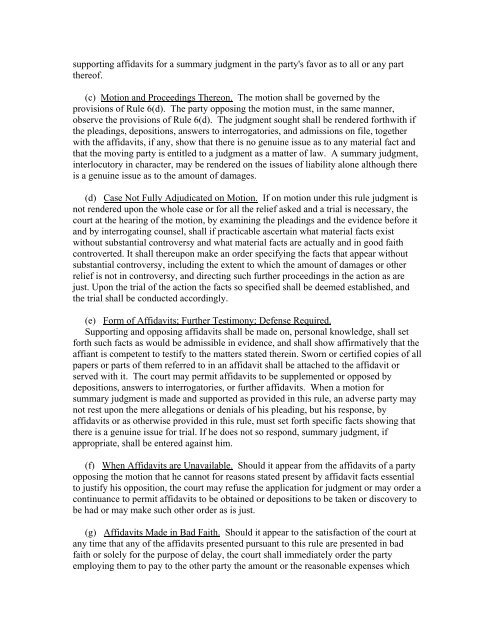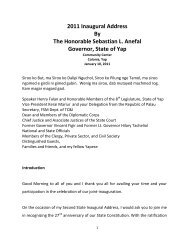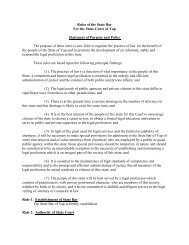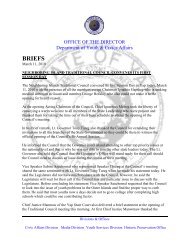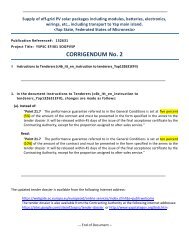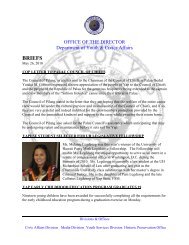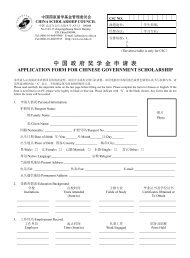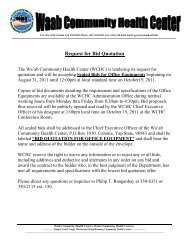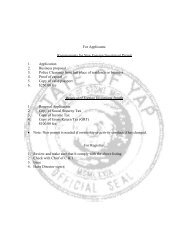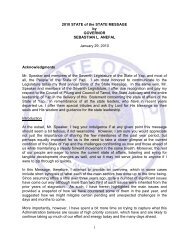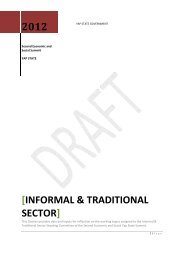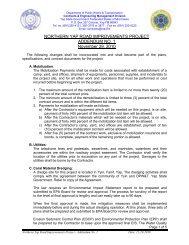RULES OF CIVIL PROCEDURE For the Trial Division of the Yap ...
RULES OF CIVIL PROCEDURE For the Trial Division of the Yap ...
RULES OF CIVIL PROCEDURE For the Trial Division of the Yap ...
You also want an ePaper? Increase the reach of your titles
YUMPU automatically turns print PDFs into web optimized ePapers that Google loves.
supporting affidavits for a summary judgment in <strong>the</strong> party's favor as to all or any part<br />
<strong>the</strong>re<strong>of</strong>.<br />
(c) Motion and Proceedings Thereon. The motion shall be governed by <strong>the</strong><br />
provisions <strong>of</strong> Rule 6(d). The party opposing <strong>the</strong> motion must, in <strong>the</strong> same manner,<br />
observe <strong>the</strong> provisions <strong>of</strong> Rule 6(d). The judgment sought shall be rendered forthwith if<br />
<strong>the</strong> pleadings, depositions, answers to interrogatories, and admissions on file, toge<strong>the</strong>r<br />
with <strong>the</strong> affidavits, if any, show that <strong>the</strong>re is no genuine issue as to any material fact and<br />
that <strong>the</strong> moving party is entitled to a judgment as a matter <strong>of</strong> law. A summary judgment,<br />
interlocutory in character, may be rendered on <strong>the</strong> issues <strong>of</strong> liability alone although <strong>the</strong>re<br />
is a genuine issue as to <strong>the</strong> amount <strong>of</strong> damages.<br />
(d) Case Not Fully Adjudicated on Motion. If on motion under this rule judgment is<br />
not rendered upon <strong>the</strong> whole case or for all <strong>the</strong> relief asked and a trial is necessary, <strong>the</strong><br />
court at <strong>the</strong> hearing <strong>of</strong> <strong>the</strong> motion, by examining <strong>the</strong> pleadings and <strong>the</strong> evidence before it<br />
and by interrogating counsel, shall if practicable ascertain what material facts exist<br />
without substantial controversy and what material facts are actually and in good faith<br />
controverted. It shall <strong>the</strong>reupon make an order specifying <strong>the</strong> facts that appear without<br />
substantial controversy, including <strong>the</strong> extent to which <strong>the</strong> amount <strong>of</strong> damages or o<strong>the</strong>r<br />
relief is not in controversy, and directing such fur<strong>the</strong>r proceedings in <strong>the</strong> action as are<br />
just. Upon <strong>the</strong> trial <strong>of</strong> <strong>the</strong> action <strong>the</strong> facts so specified shall be deemed established, and<br />
<strong>the</strong> trial shall be conducted accordingly.<br />
(e) <strong>For</strong>m <strong>of</strong> Affidavits; Fur<strong>the</strong>r Testimony; Defense Required.<br />
Supporting and opposing affidavits shall be made on, personal knowledge, shall set<br />
forth such facts as would be admissible in evidence, and shall show affirmatively that <strong>the</strong><br />
affiant is competent to testify to <strong>the</strong> matters stated <strong>the</strong>rein. Sworn or certified copies <strong>of</strong> all<br />
papers or parts <strong>of</strong> <strong>the</strong>m referred to in an affidavit shall be attached to <strong>the</strong> affidavit or<br />
served with it. The court may permit affidavits to be supplemented or opposed by<br />
depositions, answers to interrogatories, or fur<strong>the</strong>r affidavits. When a motion for<br />
summary judgment is made and supported as provided in this rule, an adverse party may<br />
not rest upon <strong>the</strong> mere allegations or denials <strong>of</strong> his pleading, but his response, by<br />
affidavits or as o<strong>the</strong>rwise provided in this rule, must set forth specific facts showing that<br />
<strong>the</strong>re is a genuine issue for trial. If he does not so respond, summary judgment, if<br />
appropriate, shall be entered against him.<br />
(f) When Affidavits are Unavailable. Should it appear from <strong>the</strong> affidavits <strong>of</strong> a party<br />
opposing <strong>the</strong> motion that he cannot for reasons stated present by affidavit facts essential<br />
to justify his opposition, <strong>the</strong> court may refuse <strong>the</strong> application for judgment or may order a<br />
continuance to permit affidavits to be obtained or depositions to be taken or discovery to<br />
be had or may make such o<strong>the</strong>r order as is just.<br />
(g) Affidavits Made in Bad Faith. Should it appear to <strong>the</strong> satisfaction <strong>of</strong> <strong>the</strong> court at<br />
any time that any <strong>of</strong> <strong>the</strong> affidavits presented pursuant to this rule are presented in bad<br />
faith or solely for <strong>the</strong> purpose <strong>of</strong> delay, <strong>the</strong> court shall immediately order <strong>the</strong> party<br />
employing <strong>the</strong>m to pay to <strong>the</strong> o<strong>the</strong>r party <strong>the</strong> amount or <strong>the</strong> reasonable expenses which


